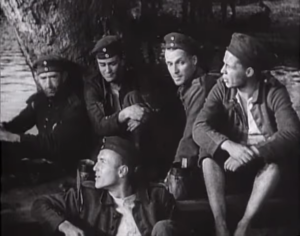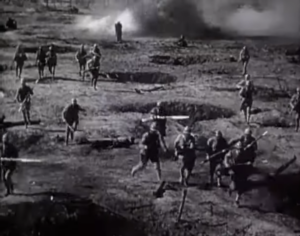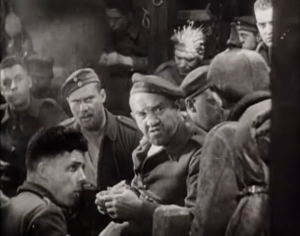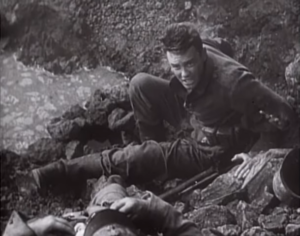Rating: 5 out of 5





I have seen many war movies in my time. I have seen films based on the American Civil War like Glory and Gettysburg. I don’t know how many movies I’ve seen on World War II. I can name Saving Private Ryan, Tora! Tora! Tora!, The Bridge on the River Kwai and even the Dirty Dozen. I have seen countless movies on the Vietnam War, from “I love the smell of napalm in the morning” Apocalypse Now to Platoon, and even Spike Lee’s Da 5 Bloods. When it comes to World War I movies, I haven’t seen that many, even though I love learning about wars.

One of the significant books on World War I is All Quiet on the Western Front by Erich Maria Remarque, a German veteran of World War I. I have never read the book but heard it is an in-depth novel that describes the German soldiers’ extreme physical and mental stress during the war. I heard that it also describes the detachment from civilian life that many soldiers might go through when they return home from the stress of that situation on them.
I want to say this before even really getting into reviewing this film. This film right here was so freakin GOOD that I was genuinely impressed, and in awe as, for one, it was made in 1930, way before you can show the extreme nature of war today. I was genuinely impressed by how realistic and harrowing the film was and how it really showed the warfare in World War I.
Directed by Lewis Milestone and being the first Best Picture winner based on a novel, All Quiet on The Western Front shows how war can affect people in many different ways, especially the soldiers. With the onset of World War I, Professor Kantorek gives an impassioned speech about the glory of serving in the army and “saving the Fatherland.” Paul Bäumer and many of his classmates become disillusioned and march out of the classroom, singing along with basking in the glory of victory and being treated as heroes. The boys quickly enlist and join the army as the new 2nd Company. On the first day of training, their new reality begins to set in at the training depot. The once-loving local postman and now Corporal Himmelstoss becomes their abusive and demanding training instructor. Himmelstoss bluntly informs the boys, “You’re going to be soldiers—and that’s all.” After the challenging training, the boys are soon shipped to the Western Front. The once romantic dream of being heroes is soon turned into a nightmare as the boys face the daily challenge of surviving trench warfare along with not being fed on a daily basis as they have to scrape for food. Paul manages to see the horrors of war as many of his once-proud friends fall one by one throughout the years. He gets a chance to go home and sees that the town he lived in has no idea what it is like on the front. With this knowledge, Paul decided to return to the front one last time and serve his country.

I am trying to think where to start this review because it is so good in all aspects. We can start with one of the major themes of the concept of blind nationalism. You want to talk about loving your country to the fullest and seeing no wrong in it, this film will show it. First, Kantorek, the schoolmaster of Paul and his friends, gives such a passionate speech that it drives the young men to join the war effort. It is never that the boys were forced to join the army. Kantorek planted the seed in the boy’s head to fight for a sense of bling patriotism and pride. Kantorek continuously states in his speech to fight for the fatherland. Everything is about giving back to the fatherland and giving them this romanticized version of warfare with glory and fame. I found this scene so powerful because you have a single person who supports the war and is like a recruiter but will never join himself. He is a hypocrite and never wants to put his own life in danger. Dude is like, “why am I going to do this when the “Iron Youth” can do it for me.” It is telling us after the speech, the boys sing, throw papers around, and join with the biggest smiles on their faces.
What I like about this film is its transition from how the boys first thought war will be like to genuinely showing that no, war is a really f**ked up thing and people will die. First, the whole training with Corporal Himmelstoss is a significant start to crushing the boys’ dream. The once playful attitude is quickly reprimanded as Himmelstoss states he will train the boys harder than ever. In the first few days, the boys are completely whipped and seemed to not be able to talk. After a few weeks, the men can finally sing and know what to do.

The absolute horror of the film comes when the boys go to war. I found this the part the best out of it all. The boys arrive and see some veteran soldiers laughing at them because they were once disillusioned to join the war. When the bombing starts, that is when s**t goes down. As the men go into the trenches and rewire the barbed wire, Behn tries to save a man, only for shrapnel to hit, blinding him. As he screams, “My eyes,” dude is gunned down. Another scene is when the men are under heavy bombardment. They can’t sleep and start screaming and whimpering as the bombing keeps going on and on. Franz completely goes insane and runs out and gets hit by a bullet. Once the bombing stops, they hear a whistle and must go and fight. After the fight, Franz is seen being amputated but what really gets this scene is one of his friends wants his boots because they are a really nice pair, and since Franz will never fight again, he wants them.
There are so many scenes that I could go on and on about, from how the boys need a tender and loving touch of women to people who once stated and thought they would never have to fight, showing up on the front lines and really showing how much “patriotism” they really have. How money in the army really isn’t worth anything. A soldier’s worth among his comrades is whether he has cigarettes and soap. Just think about that. Soap and cigarettes will get you many things rather than that all mighty dollars? One of the other themes that must be talked about is how hard it is for a person to return to civilian life from war. I heard my dad having a tough time. For one, the constant bombing will get to you, but if one slept on the ground for months, then a bed would feel strange. I like how the film showed how naïve people in the town where Paul once lived were. They were so clueless and even called Paul a coward when he tried to tell them that everything they know and hear is just flat-out wrong.

Now, what is one of the BEST parts of the whole film is the cinematography. It is one of the best I have seen in film because it showed people’s emotions and situations so freakin well. First, when the boys are in the school. The camera zooms in on the professor’s face to show his passion, while it then goes to each boy to show their elation. Another scene is when the boys are training, they have to lay face down in the mud, and the camera zooms on some of the faces to show their fear and disgust. All the war scenes are amazingly done. During the fight over no man’s land, you see men gunned down as the camera jumps back and forth between the gunner and the men reaching the barb-wired fence. One man grabs the fence only for a bomb to hit, leaving only his hands. I wanted to say that the movie really shows how violent and intense shit got for an old-school film.
EVERYONE in this film did a great job of acting and showing how war is like. It almost felt like you were watching the real thing as each person was great in their role. Louis Wolheim as Stanislaus Katczinsky was my favorite because he told it how it was and seen so much of the war that he had a negative view of it. Lew Ayres as Paul Bäumer was great as the once bright-eyed student who saw his world change and innocents lost with war.
I wrote for too long. All I have to say is All Quiet on the Western Front is one of the best war movies of all time. If you have seen Saving Private Ryan, then you will love this movie. To me, this is the godfather of how a war movie should be done and displayed.